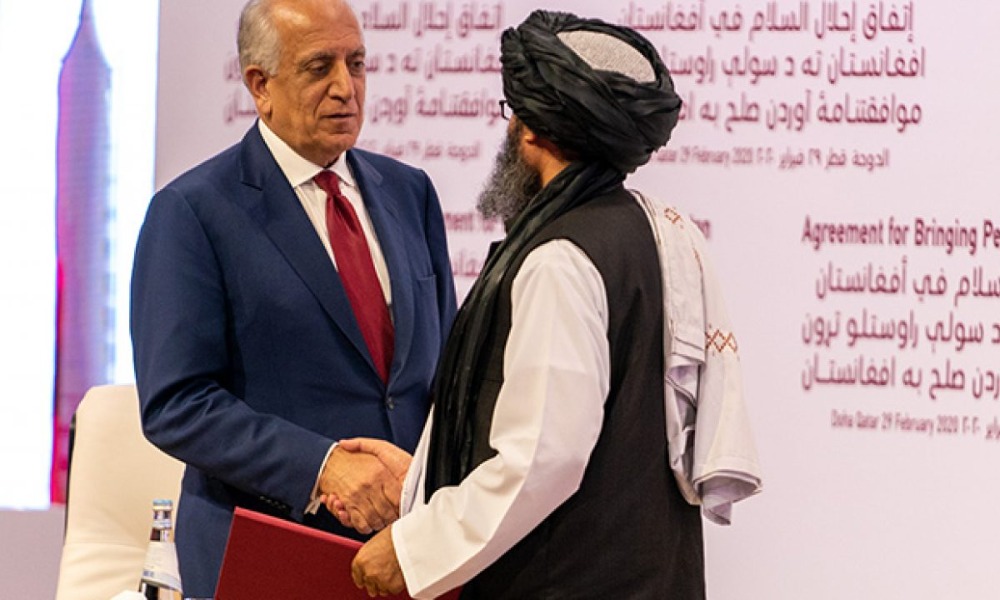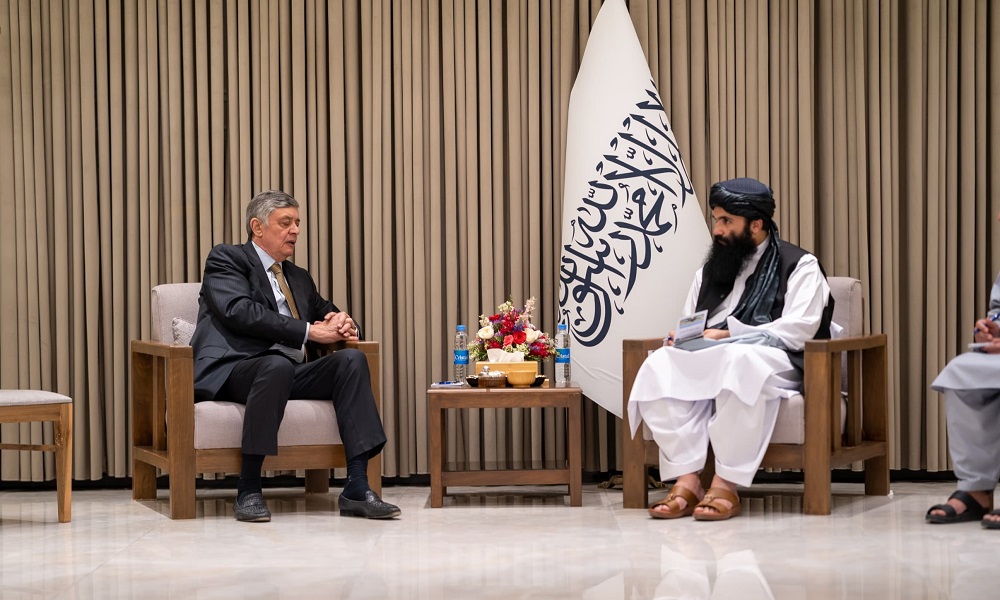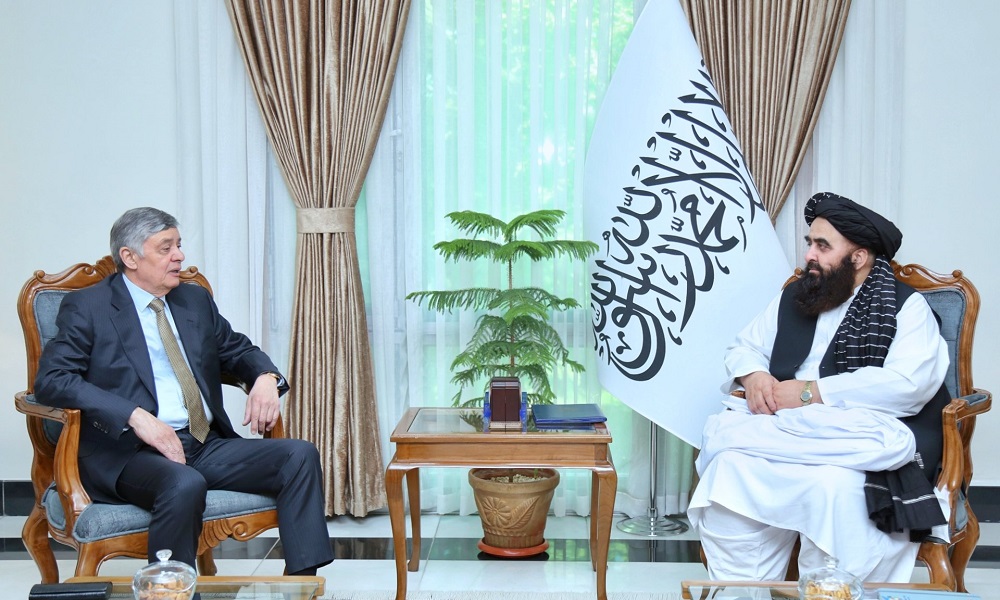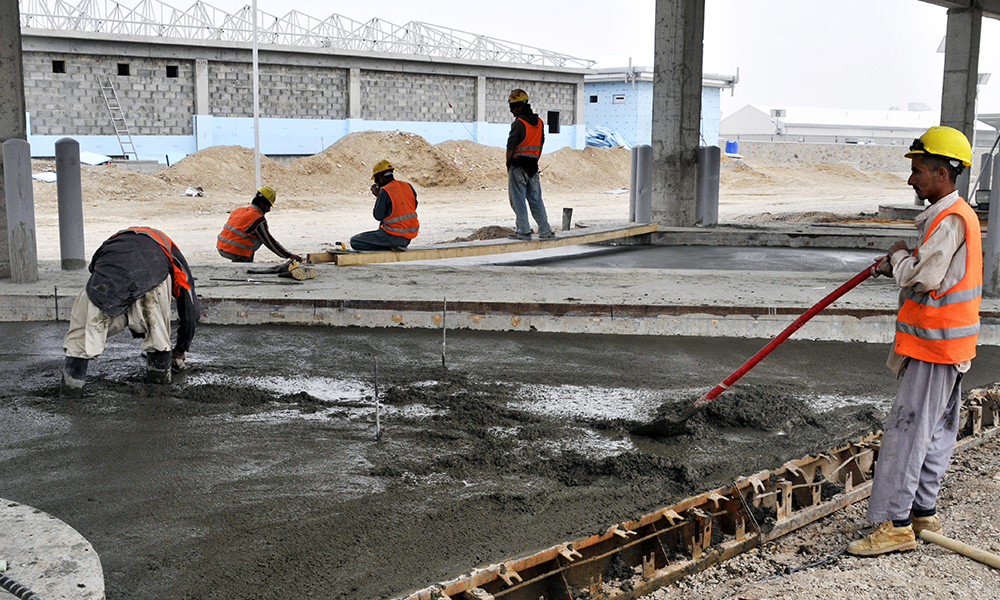Latest News
Key points outlined in Washington’s plan for transitional govt

US Special Representative for Afghanistan Reconciliation Zalmay Khalilzad has handed over Washington’s plan for the formation of a transitional government in Afghanistan, the Taliban confirmed.
In an interview with Ariana News, Taliban spokesman Mohammad Naeem said the plan was being considered by the Taliban’s leadership in Doha and that “a final decision has yet to be made in this regard.”
Naeem stated that the plan includes a transitional government, an Ankara, Turkey summit, and a ceasefire.
He added that the Taliban has not yet taken a clear position in this regard.
Meanwhile, the Afghan government has also received US President Joe Biden’s proposed plan for the formation of a participatory government which includes the Taliban and the convening of an international summit.
Nader Naderi, a member of the government’s peace delegation said Sunday the plan needs serious and careful consideration.
“We have received many plans from different countries, but these plans need to be seriously and comprehensively reviewed in order to meet the interests of the people,” Naderi stated.
The plan consists of three key points; a principled guideline for the future of Afghanistan, a transitional government, and a permanent ceasefire.
According to a section of the plan that Ariana News read, a President of Afghanistan would be elected at the end of the transitional government period.
According to the plan, Islam will be considered the official religion of the country, and all Afghan citizens are granted immunity as “Afghanistan is a common home of all ethnicities and religions.”
The Transitional government will consist of the following three main cornerstones:
- The executive administration, including a president, deputies, ministers, and independent directorates
- Legislature, which includes the Senate and Parliament, in which the Taliban will be represented and;
- The judiciary, which would also include the Independent High Council of Islamic Jurisprudence and the Commission for Drafting a New Constitution.
According to the plan, the High Council of Islamic Jurisprudence will be composed of 15 members including seven Taliban members, seven members of the Afghan government, and a person would be chosen by the president of the government.
The council would be tasked to prepare Islamic guidance for social and cultural affairs.
Meanwhile, the Afghan NSA Hamdullah Mohib stated that the plan is not the US government’s official scheme for Afghanistan.
The plan that the Americans have handed over to everyone; we have been told that it is not the US government’s official plan, said Mohib adding that the government is reviewing it.
Addressing a press conference in Kabul Mohib stated that the plan is aimed at sharing power to resolve the current security issues.
Latest News
Moscow’s move a ‘significant step toward recognizing Afghanistan’s political realities’, says Haqqani

Acting Minister of Interior Sirajuddin Haqqani on Wednesday met with Zamir Kabulov, Russia’s special envoy for Afghanistan, and Dmitry Zhirnov, Russia’s ambassador to Kabul.
Haqqani expressed appreciation for Moscow’s recent decision to remove the Islamic Emirate from its list of terrorist organizations. He described the move as “a significant step toward recognizing the political realities of Afghanistan.”
In a statement, the interior ministry said that both sides emphasized the importance of upgrading diplomatic relations to the level of embassies and reaffirmed their commitment to mutual cooperation in the fields of security and trade.
During the meeting, the two parties also discussed regional and bilateral cooperation in the areas of security, economy, and commerce, and stressed the need to strengthen ties between the two countries.
Latest News
Special meeting will be held to launch Afghanistan–Russia joint commission, says Kabulov

Zamir Kabulov, Russia’s special envoy for Afghanistan, on Wednesday met with Afghanistan’s Acting Minister of Foreign Affairs Amir Khan Muttaqi in Kabul and said a special meeting will be held on the sidelines of the Kazan Forum to officially launch the permanent joint commission between Russia and Afghanistan.
According to a statement issued by the Afghan foreign ministry, Kabulov said that expanding relations with Afghanistan is important to Russia, and for that purpose, Moscow has taken steps to remove obstacles in the path of developing bilateral ties.
This comes after Moscow last week removed the Islamic Emirate from their list of militant organizations.
During the meeting, Muttaqi expressed appreciation for Russia’s recent move to remove the IEA from its list of banned organizations and stated that the Islamic Emirate will soon appoint a diplomat at the ambassadorial level to serve in Moscow.
The two sides also discussed enhancing bilateral relations between Afghanistan and Russia, expanding economic and trade cooperation, and addressing certain regional issues.
The 16th International Economic Forum “Russia – Islamic World: Kazan Forum” will be held from May 13 to 18 in the city of Kazan, Russia. Afghan products and goods will be showcased at the event.
Latest News
Balochistan business chamber asks Islamabad to issue work permits to Afghan refugees
This comes amid Pakistan’s ongoing campaign to expel hundreds of thousands of Afghan refugees living in the country.

The Balochistan Chamber of Commerce and Industry in Quetta, Pakistan, has appealed to the federal government to issue work permits to skilled Afghan refugees who work in various sectors including mining and agriculture.
Haji Akhtar Kakar, the vice president of the chamber of commerce and industry, made the request while pointing out that the existing shortage of skilled labour could worsen further if the issue was not addressed promptly, Dawn news reported.
This comes amid Pakistan’s ongoing campaign to expel hundreds of thousands of Afghan refugees living in the country.
Akhtar said however that due to Balochistan’s deteriorating security situation, mine owners, farmers and industrialists have had to rely on Afghans for skilled labor as Pakistani workers from other provinces were reluctant to move to Balochistan.
According to him, the decision to expel Afghan refugees had severely impacted the agriculture, mining, and industrial sectors in Balochistan, as a significant portion of the workforce came from Afghanistan.
-

 Sport5 days ago
Sport5 days agoAfghanistan qualify for U19 Cricket World Cup 2026
-

 Regional5 days ago
Regional5 days agoDeadliest US strike in Yemen kills 74 at oil terminal, Houthis say
-

 World4 days ago
World4 days agoThousands of protesters rally against Trump across US
-

 World4 days ago
World4 days agoIran, US end nuclear talks in Rome, agree to meet next week
-

 Latest News4 days ago
Latest News4 days agoPolio vaccination campaign launched in Afghanistan
-

 International Sports4 days ago
International Sports4 days agoIPL 2025: 14-year-old Vaibhav Suryavanshi becomes youngest IPL player
-

 International Sports2 days ago
International Sports2 days agoIPL 2025: Robo-Dog ‘Champak’ explained
-

 Latest News3 days ago
Latest News3 days agoChina invites various Afghan delegations to attend Shanghai forums
























